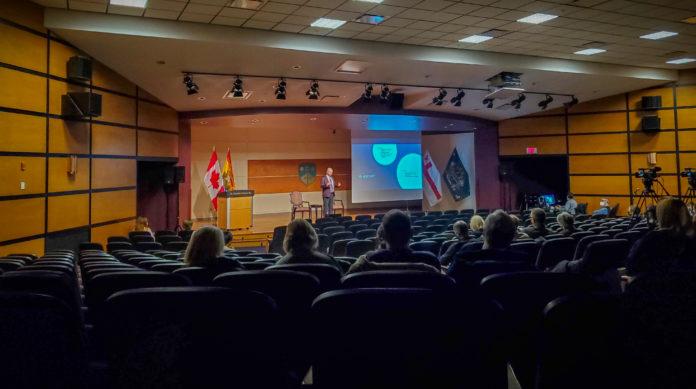
Ian Sutherland, one of the candidates for president and vice-chancellor of St. Thomas University, gave their presentation on Dec. 6 at Kinsella Auditorium.
Nauman Farooqi, also a second candidate for the role, gave his presentation on Dec. 5.
Related: Farooqi gives presentation on candidacy for STU’s presidency
Sutherland is vice president of the Grenfell Campus at the Memorial University of Newfoundland. They said community is the centre of both Grenfell and STU, as both universities are small.
Sutherland added more can be done at STU to improve equality, diversity and anti-racism.
“I want us to be a university of all, for all,” said Sutherland. “Belonging is the secret sauce.”
As a member of the 2SLGBTQIA+ community, Sutherland said they know what it is like not fitting in, which is why they are committed to improving in those areas.
Sutherland also named Indigenization as a responsibility of universities in Canada.
“The way I see this is that Indigenization means that we are all living the journey of truth and reconciliation,” they said.
They recognized fiscal sustainability as the first challenge for STU, which is why recruitment and other sources of funding are important to them.
“I have lived this with it every day for the last almost seven years,” said Sutherland, noting that tuition should not be the only revenue a university has.
“I’m thinking about facilities rentals, conference services, summer camps — those kinds of things that universities do that also bring funding,” they said.
Related: EXPLAINER: Meet the two candidates vying for STU president, vice-chancellor
They said there are lots of “good signs” about recruitment and retention, as more people moved to New Brunswick during the pandemic.
“We’ve all seen the migration from larger provinces and cities to smaller provinces and cities,” they said.
They identified innovation and program growth as priorities of the university, especially referring to the environment and society program. They said creating certificates and other paths toward education is key.
“Credentials, micro-credentials are almost a pipeline for students to come into the university at various levels and continue working with us,” said Sutherland.
“This is also a way to make the university accessible from equity and diversity. The students that may feel reticent prepare directly into a degree program.”
They also want to increase bursaries and scholarships on STU by fundraising and building connections with donors, alumni and stakeholders.
Sutherland emphasized the importance of liberal arts education regardless of the anti-liberal arts sentiment.
“We are essential because what we do … is we explore the question we plumb the depths of the meaning and the nature and that is absolutely critical to any vibrant successful society,” they said.
